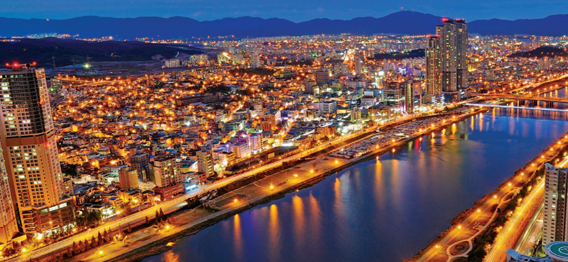Business Conditions for Entering UFEZ
Northeast Asia’s Emerging Energy Hub
Designated in December 2019, the Ulsan Free Economic Zone (UFEZ) is being developed as a central platform for clean energy, hydrogen technologies, green mobility, and R&D-driven growth. The zone spans more than 4.70 km² across three districts: The Hydrogen Industry Base District, Electrogen Auto Valley, and R&D Business Valley.
UFEZ aims to capitalize on Ulsan city’s industrial heritage (automobiles, shipbuilding, petrochemicals) by guiding transformation toward sustainable, future industries. Its goal is to become a world-class hydrogen city by 2030.

Key Districts & Focus Areas
UFEZ consists of three primary districts, each tailored to support distinct but interlinked strategic industries:
- Hydrogen Industry Base District: Focused on demonstration, R&D, and integration of facilities in the hydrogen industry. It seeks to build Ulsan into a hydrogen city with full-cycle production, supply, demonstration, and supporting infrastructure.
- Electrogen Auto Valley: Designed to develop clusters of hydrogen/electric vehicle parts, establish ecosystems for parts production, and integrate with Ulsan’s existing automobile manufacturing base.
- R&D Business Valley: Dedicated to research & development, housing institutions in clean energy, fuel cells, etc., plus fostering a settlement environment for companies and staff. Mid- to long-term living and business infrastructure are part of this district.
Benefits & Incentives for Investors
UFEZ offers multiple advantages for companies and institutions locating in these strategic districts. From what’s available in official documents and statements, here are the recorded benefits:
Strong Industrial Infrastructure & Existing Clusters
Ulsan already hosts major industries (automobile, shipbuilding, petrochemicals), research institutes, public institutions, and educational institutions in energy and related fields, which investors can tap into. This reduces the cost of building out supply chains and collaborative R&D.
Regulatory & Financial Incentives
UFEZ has been designated with regulatory innovation mandates, meaning companies in certain new industries (e.g. hydrogen, secondary batteries) can expect preferential regulatory treatment.
The zone aims to attract both foreign and domestic investment with incentives like tax support, potential reduction or exemption in various charges, and preferential conditions for investment subsidy.
Private contracts and cost-based sales on construction are allowed under certain conditions.
Living and Support Environment
UFEZ invests in creating settlement infrastructure: housing, cultural and education facilities, and an improved environment for companies and employees. This includes long term development of living environment in R&D Business Valley.
Ambitious Growth Targets & Scale
UFEZ has set measurable goals: By 2030 to attract investment (both domestic and foreign), to create jobs, to build a large-scale hydrogen ecosystem (including a large number of hydrogen vehicles), and to develop import/export infrastructure like hydrogen terminals and offshore wind power links.
Strategic Positioning in Energy Transition
UFEZ is aligning with national energy strategy: the zone is developing offshore wind power infrastructure, storage & import terminals (e.g. green hydrogen and ammonia), to serve as a logistics hub for new energy.
Sources:
https://fez.go.kr
https://www.ulsan.go.kr/s/ufezEng/main.ulsan
Created on 30th October, 2025